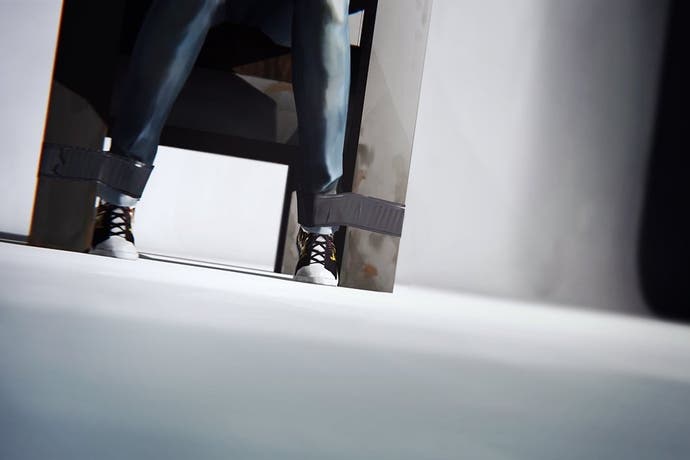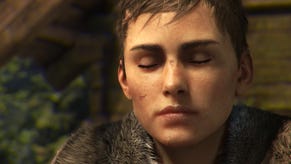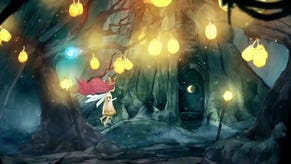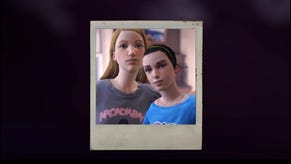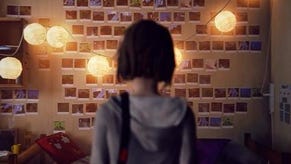Life is Strange review
Time out of joint.
It's difficult to think of a way to convincingly recommend Life is Strange without including a multitude of caveats. It's an interactive drama, but the story isn't always well-written and the dialogue is frequently clumsy. It strikes at an audience other games rarely consider, but there's a lot of half-baked teen angst going on. It has a gorgeous, unique art style, but the graphics are nothing special. Some episodes are fantastic - others are not. But, for every reason I think someone might not get along with Life is Strange - it features piss-poor lip synching and its gameplay and story are sometimes straight-up not talking to one another - I still have to recommend it, more so than any other game I've played this year. Despite its many flaws, I can't help but think of it as one of the best interactive story games of this generation.
In less than a year and over the course of five episodes, Life is Strange has managed to transform itself from a little game nobody really cared about by a little French studio nobody really knew to one of the most talked-about releases of 2015. That metamorphosis began slowly; I remember, after playing the first episode, that bringing it up in conversation with others who had played it would always evoke the same, pleasantly surprised, wide-eyed head-nod. "Life is Strange? Yeah, it's alright actually. It's interesting." That word, interesting, continues to follow any and all discussion of the game. Interesting. It's safe to use, because even if you recommend it to someone and they don't like it, there are few who would say Life is Strange isn't interesting.
It's hard to sum up the game's premise in a way that doesn't make it sound awful. You play as a shy, thoughtful, photography-obsessed 18-year-old who returns to her childhood hometown after a few years away in order to attend an elite academy known for turning out up and coming artists. She keeps a diary, takes selfies, and without a doubt has 'free-thinker, tea-drinker' in her Tumblr or Instagram bio. She finds out she can rewind time after a girl is fatally shot in her school bathroom. After saving the girl, Max finds out that it's her childhood friend Chloe, whom she hasn't connected with in over five years. Over the course of the next week, the two are brought closer than ever as they investigate the disappearance of Chloe's friend Rachel Amber, Max comes to terms with her powers, and the threat of an apocalyptic storm looms over their sleepy Pacific Northwestern town of Arcadia Bay.
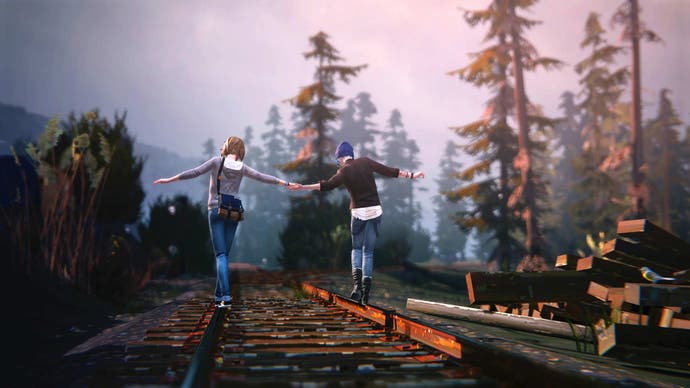
How you actually play Life is Strange varies from moment to moment, but it isn't dreadfully reductive to say that it's similar to the interactive drama format made popular by Telltale's The Walking Dead. You'll control Max as she explores her surroundings, sometimes solving environmental puzzles and sometimes engaging characters in multiple-choice conversations. Quizzing subjects, you'll often be given contextual clues and additional information that you can then use to unlock further conversation options by rewinding time and approaching the interaction from a different angles.
This social manipulation starts out small - can you get your teachers and fellow classmates to like you by bringing up stuff they're interested in before they do? - but eventually and inevitably becomes a matter of life and death, as you try and talk people out of running into the jaws of their certain demise. Every so often, the game will render your powers temporarily useless and force you to call upon everything you've learned about someone or something so far to prevent a disaster, without the safe fallback of a do-over. It's in these moments that Life is Strange shines brightest - when it's just a story about a girl trying to fit in and do her best.
In fact, the game is at its best when it just allows you to explore the world around you; when it focuses on the small moments when Max can really make a difference in someone else's life, rather than the grand, sweeping cosmic changes that happen as a result of her messing with the space-time continuum. Every episode, there'll be two or three bigger decisions that can affect the relationship between your characters and outcome of your story, but once a mechanic is introduced in later episodes that allows Max to travel much further back into the past, it effectively renders all those little moments meaningless. Looking at it quite so starkly, the entire game could effectively be boiled down to just one decision - but that would be to completely overlook the journey it took to get there, and how capably Life is Strange gets you to care not only about the choices you make, but every single one of its key characters.
Developer Dontnod has said that every character started out as an archetype on their drawing board, and you can absolutely see that in the first episode. Here's the rich bitch, there's the jock, there's the cheerleader and the awkward nerd that doesn't know what to do with his sex drive. But if you take the time to stop and talk to these individuals, to make a point of looking more closely at how they interact with one another, you'll meet people with actual depth. Wandering around Blackwell Academy is like diving headlong into a Rorschach print of your high school days.
Did you hate the popular kids at your school? Treat the Vortex clique as you'd expect them to treat you and you won't be disappointed, but actually make an effort with a few of their members and they can be surprisingly welcoming. Think the nerdy kids are dull and/or a bit creepy? Show an interest in their passions and they'll make time in their busy schedule for you. Not that you'll need it; Max literally has all the time in the world, or so you'd think. One of the most interesting - there's that word again - things about Life is Strange is how much Max's character can change over the course of the five episodes, when she must eventually confront the fact that she's perhaps not as altruistic as she - and we - believe her to be.
When Life is Strange is at its most interesting is not when it's exploring the concept of free will versus determinism or when it's talking multiverse theories and getting tangled in its own logic. It isn't even when it's investigating a potential murder mystery. Life is Strange comes alive when it's focusing on the mundane, on the push and pull of everyday life; that's when it reveals itself as perhaps one of the most emotionally intelligent and thoughtful games in years. When it's confident enough in itself to let you do nothing but lie in bed listening to a song on the radio as a gentle breeze laps through an open window. When it has the stomach to tackle real-world issues that real players went or are going through: issues like suicide, slut-shaming, social anxiety, questioning your sexuality, and every other little everyday trauma that falls under the umbrella of growing up and seeking acceptance from your peers and from yourself.
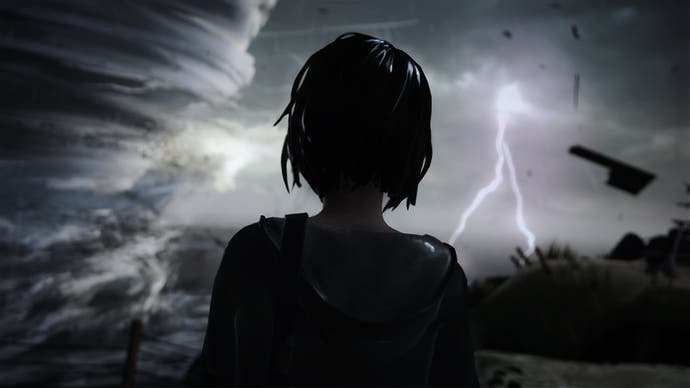
It doesn't matter that the lip synching is off when the voice acting is mostly excellent. It doesn't matter that a mostly French, mostly male development team doesn't always get the intricacies and complexities of female friendship (although they do a remarkable job, all things considered), when the characters are, by and large, hella relatable even when they aren't particularly likeable. It doesn't matter that the story and dialogue aren't always perfect when the overall concept and execution show such ambition and heart. And it doesn't matter that, by the end, some choices feel unbalanced or even meaningless when the journey to making them was so, well, interesting. I can't think of any other games I've played that have become huge talking points across a diverse range of players, tackled surprisingly dark subject matter with sensitivity and respect, and made me feel nostalgic for a time in my life long past while still damn glad I'm not a teenager any more. Life is Strange has achieved so much more than anyone ever expected it to. It's interesting. It's a must-play.
